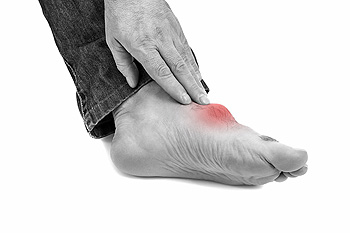Excess uric acid in the bloodstream may produce a condition that is known as gout. It can cause pain and discomfort, and in severe cases, permanent joint damage may occur. Patients who have family members afflicted with gout may have an increased risk of developing this condition, in addition to those who practice unhealthy lifestyle habits. The common symptoms that are associated with this ailment can include pain in the joints of the big toe, swelling, redness, and it may be difficult to walk. Moderate relief may be found when the affected foot is elevated, and healthy eating habits are enforced. Research has indicated it may be beneficial to drink plenty of water daily, and the gout attacks may become less frequent when a gentle exercise routine is frequently practiced. If you have developed gout, it is advised that you schedule a consultation with a podiatrist who can properly treat this condition.
Gout is a painful condition that can be treated. If you are seeking treatment, contact Dr. Odin De Los Reyes from Connecticut. Our doctor will treat your foot and ankle needs.
What Is Gout?
Gout is a form of arthritis that is characterized by sudden, severe attacks of pain, redness, and tenderness in the joints. The condition usually affects the joint at the base of the big toe. A gout attack can occur at any random time, such as the middle of the night while you are asleep.
Symptoms
- Intense Joint Pain - Usually around the large joint of your big toe, and it most severe within the first four to twelve hours
- Lingering Discomfort - Joint discomfort may last from a few days to a few weeks
- Inflammation and Redness -Affected joints may become swollen, tender, warm and red
- Limited Range of Motion - May experience a decrease in joint mobility
Risk Factors
- Genetics - If family members have gout, you’re more likely to have it
- Medications - Diuretic medications can raise uric acid levels
- Gender/Age - Gout is more common in men until the age of 60. It is believed that estrogen protects women until that point
- Diet - Eating red meat and shellfish increases your risk
- Alcohol - Having more than two alcoholic drinks per day increases your risk
- Obesity - Obese people are at a higher risk for gout
Prior to visiting your podiatrist to receive treatment for gout, there are a few things you should do beforehand. If you have gout you should write down your symptoms--including when they started and how often you experience them, important medical information you may have, and any questions you may have. Writing down these three things will help your podiatrist in assessing your specific situation so that he or she may provide the best route of treatment for you.
If you have any questions, please feel free to contact our offices located in Southbury and Farmington, CT . We offer the newest diagnostic and treatment technologies for all your foot care needs.

